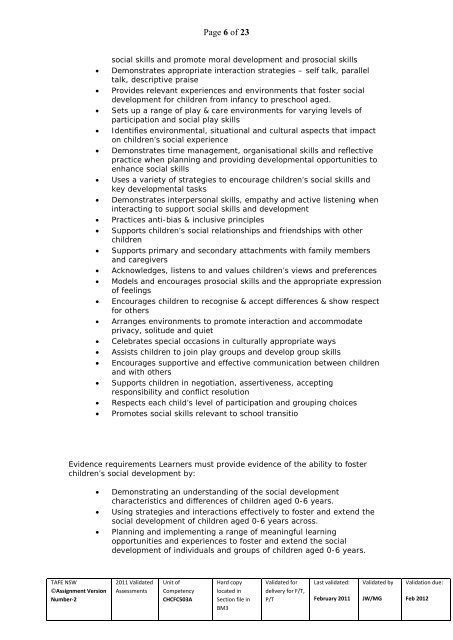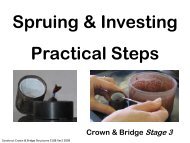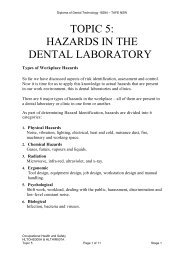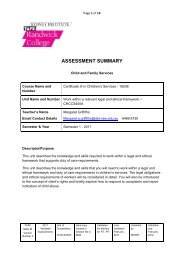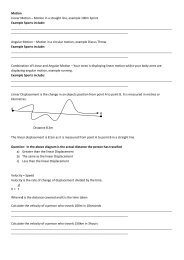CHCFC503A - Randwick College Wiki
CHCFC503A - Randwick College Wiki
CHCFC503A - Randwick College Wiki
You also want an ePaper? Increase the reach of your titles
YUMPU automatically turns print PDFs into web optimized ePapers that Google loves.
Page 6 of 23<br />
social skills and promote moral development and prosocial skills<br />
• Demonstrates appropriate interaction strategies – self talk, parallel<br />
talk, descriptive praise<br />
• Provides relevant experiences and environments that foster social<br />
development for children from infancy to preschool aged.<br />
• Sets up a range of play & care environments for varying levels of<br />
participation and social play skills<br />
• Identifies environmental, situational and cultural aspects that impact<br />
on children’s social experience<br />
• Demonstrates time management, organisational skills and reflective<br />
practice when planning and providing developmental opportunities to<br />
enhance social skills<br />
• Uses a variety of strategies to encourage children’s social skills and<br />
key developmental tasks<br />
• Demonstrates interpersonal skills, empathy and active listening when<br />
interacting to support social skills and development<br />
• Practices anti-bias & inclusive principles<br />
• Supports children’s social relationships and friendships with other<br />
children<br />
• Supports primary and secondary attachments with family members<br />
and caregivers<br />
• Acknowledges, listens to and values children’s views and preferences<br />
• Models and encourages prosocial skills and the appropriate expression<br />
of feelings<br />
• Encourages children to recognise & accept differences & show respect<br />
for others<br />
• Arranges environments to promote interaction and accommodate<br />
privacy, solitude and quiet<br />
• Celebrates special occasions in culturally appropriate ways<br />
• Assists children to join play groups and develop group skills<br />
• Encourages supportive and effective communication between children<br />
and with others<br />
• Supports children in negotiation, assertiveness, accepting<br />
responsibility and conflict resolution<br />
• Respects each child’s level of participation and grouping choices<br />
• Promotes social skills relevant to school transitio<br />
Evidence requirements Learners must provide evidence of the ability to foster<br />
children’s social development by:<br />
• Demonstrating an understanding of the social development<br />
characteristics and differences of children aged 0-6 years.<br />
• Using strategies and interactions effectively to foster and extend the<br />
social development of children aged 0-6 years across.<br />
• Planning and implementing a range of meaningful learning<br />
opportunities and experiences to foster and extend the social<br />
development of individuals and groups of children aged 0-6 years.<br />
TAFE NSW<br />
©Assignment Version<br />
Number-2<br />
2011 Validated<br />
Assessments<br />
Unit of<br />
Competency<br />
<strong>CHCFC503A</strong><br />
Hard copy<br />
located in<br />
Section file in<br />
BM3<br />
Validated for<br />
delivery for F/T,<br />
P/T<br />
Last validated:<br />
February 2011<br />
Validated by<br />
JW/MG<br />
Validation due:<br />
Feb 2012


